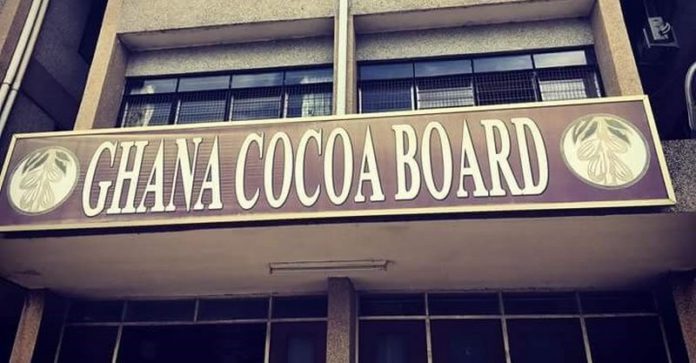Ghana’s number one radio and TV station, Adom FM/TV reached out to Ghana Cocoa Board (COCOBOD) to explain why it has consistently defaulted on loans granted by the Bank of Ghana as captured in the Auditor-General’s report.
As an organisation committed to education, entertaining and informing listeners and viewers, News Editor, Martha Crenstil-Acquah wrote to management of COCOBOD to seek clarity.
In response, COCOBOD vehemently denied the allegations noting that, it adhered to its interest obligations and arranged an extension for principal repayment, with repayments set to commence in October 2024.
Below are the questions and response:
- Can you explain why COCOBOD has consistently defaulted on loan facilities granted by the Bank of Ghana?
Response:
COCOBOD firmly denies any consistent default on its loan facilities with the Bank of Ghana. Specifically, they address the 10-year loan facility arranged in 2013, which arose from cumulative cocoa bills dating back to 2010/2011. COCOBOD explains that due to cash flow challenges caused by low cocoa prices during the COVID-19 pandemic, they sought and were granted an extension for the principal repayment of this loan. Throughout this period, COCOBOD consistently serviced the interest obligations on the loan and never defaulted on the payments. The principal repayment is now scheduled to begin in October 2024, and COCOBOD emphasizes that there has been no default on this facility.
- What measures are being implemented to address the GH¢8.241 billion outstanding principal amount?
Response:
The GH¢8.241 billion mentioned includes two main components:
- GH¢1.99 billion 10-year loan facility: COCOBOD has already repaid a portion of this amount (GHS615.2 million) and, due to cash flow issues, successfully negotiated an extension for the repayment of the remaining principal, which now stands at GHS1.384 billion. Repayment of this remaining balance is scheduled to commence in October 2024.
- GH¢6.857 billion cocoa bills: These bills were initially raised in 2016/2017 to support cocoa purchases amid a significant drop in cocoa prices. COCOBOD struggled to repay these bills due to continued low revenue from cocoa sales. However, during the 2023 Domestic Debt Exchange Program, the government intervened by taking over this debt and granting COCOBOD a 50% discount on the outstanding amount. This move significantly reduced COCOBOD’s liability on this debt, and the remaining balance has been adjusted in their 2023 financial statements.
- What strategies does COCOBOD have in place to ensure timely repayment of future loans?
Response: Not directly answered. However, the statement implies that COCOBOD is working on maintaining timely interest payments and adhering to the agreed repayment schedule.
- How is COCOBOD planning to mitigate the risk of future defaults and improve financial management practices?
Response: Not directly answered.
- How does COCOBOD plan to work with the Bank of Ghana to establish clear repayment plans and ensure adherence to these plans?
Response:
COCOBOD’s response highlights ongoing cooperation with the Bank of Ghana, particularly in negotiating the extension of the principal repayment schedule for the GH¢1.99 billion loan. This cooperation led to an agreement where COCOBOD could delay repayment until October 2024 without defaulting.
- What steps is COCOBOD taking to improve transparency and accountability in its financial dealings?
Response: Not directly answered.
- How does COCOBOD plan to address the recommendations made by the Auditor General to recover the outstanding debt?
Response: Not answered.
The release mainly focuses on defending against claims of default and detailing how some of the debts were restructured rather than providing detailed plans for future financial management improvements.


